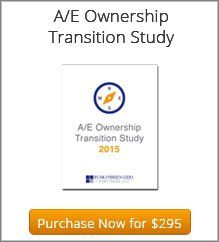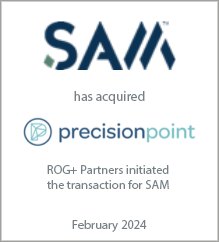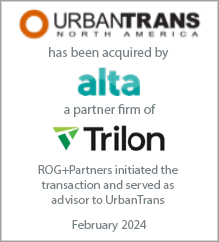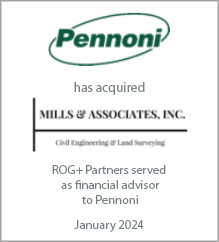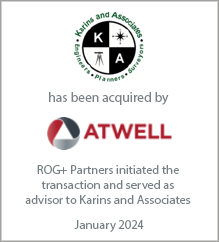Michael S. O'Brien is a principal in the Washington, DC office of Rusk O'Brien Gido + Partners. He specializes in corporate financial advisory services including business valuation, fairness and solvency opinions, mergers and acquisitions, internal ownership transition consulting, ESOPs, and strategic planning. Michael has consulted hundreds of architecture, engineering, environmental and construction companies across the U.S. and abroad.
“We Need to Talk”: A Primer on Kick-Starting Ownership Transition Efforts
“We Need to Talk”: A Primer on Kick-Starting Ownership Transition Efforts
January 12, 2012
In the middle of a recent ownership and leadership planning engagement, I received a call from one of the two shareholders describing that the other owner suddenly developed a health issue and, as a result, they now need to explore new options. I had known both owners for years and they always had reasons for delaying a transition discussion, from general anxiety to “it’s not the right time.” Now, they are finally taking action in which the choices are much more limited because they ran out of time and viable structure options. In fact, within the last three months, I have had three clients that had unforeseen issues arise and they were forced to watch good employees leave because of uncertainty surrounding ownership and leadership discussions, because they dread the frankness of “The Talk.”
What goes through your mind when you hear, “We need to talk?” We all dread “The Talk,” and immediately go on the defensive. Why? It makes us uncomfortable. Now, after years of kicking the can down the road, we are seeing more A/E firms opening up discussions regarding ownership transition, and oftentimes (as illustrated above) because of forces beyond their control. As an average 10,000 people a day or nearly 80 million Americans through 2030 reach the retirement age of 65, many closely held companies are being forced to critically assess how they transition ownership and leadership.
I have been working as an advisor for more than 20 years and have seen my fair share of companies ranging from very poor management and operations to outstanding. But sadly a lack of ownership and leadership planning is common for firms of all shapes, sizes, and backgrounds. Failure to plan for ownership and succession planning will more than likely lead to a failed end. So why do firms do this, especially successful and well run organizations? Some of the most common themes I have come across include the following:
Today, it’s been my experience many A/E and environmental consulting firms of all shapes and sizes select the last category.
Anxiety Attack
Giving up control creates anxiety for owners because ultimately they don’t want others directing or influencing the company and they don’t want to feel less valued by their employees and clients. If control is important to an owner or group of owners, then that company is not creating an environment for developing leaders. Leadership is a cultivated skill that gets created in an environment where the leaders themselves become replaceable.
Too often though, owners equate giving up responsibility to giving up control. Allowing for some decentralization of the decision making process, such as identifying people to hire, managing the project resource allocations, accounts receivable collection meetings, and the like, only encourages younger employees to feel that they can add value. Control lies in the power to shape the direction of the decisions that your managers make. It may seem counterintuitive, but the less you make your firm rely on you for business development and operational and financial management, the more value you create for your company. Giving up responsibility does not equate to giving up leadership.
Generational Differences
Many firms are delaying their planning because of real or perceived generational differences. As one of my clients said to me a couple years ago, “I blame myself for this situation because we protected our younger generations too much from ‘bad experiences’ in life, thus creating an environment of entitlement.” With the lackluster economy, this sentiment about the next generation is changing.
Recently, I was working with a client who needed to redeem a large shareholder and sell shares to select employees– and I recommended that they offer ownership to some younger employees. My client did not think that this was possible because the younger employees might not possess the financial know-how to take full advantage of such an offer, nor did they think it would be fair to other, more experienced employees. Much to their surprise, the experienced employees were receptive to the idea of the younger ones having a meaningful stake in the company. Working with both the employees and the owners, we were able to better open the lines of communication – and allow for the sharing of ideas and concerns of all parties.
Weak Financial Performance
Owners nearing retirement want to obtain the highest price for their interest in the company. So why should owners sell their shares when the value is low? However, waiting for the market to return is risky, and selling shares does not mean sell ALL of your shares. It is common practice for owners nearing retirement to sell a portion of their interest over time to take advantage of the future value increases and reduce the risk against future decreases in value.
When large shareholders sell some of their shares in a valuation that is perceived low, they are sending a message to those key employees that the company is committed to them by sharing a greater upside potential than downside risk. The selling shareholder is also reducing his future redemption risk because he has a smaller stake going forward. Even if his reduction in percentage in ownership is marginal, any reduction is an improvement in managing the company’s future redemption risk.
Rusk O’Brien Gido + Partners have facilitated discussions between internal buyers and sellers of A/E and environmental consulting firms and are experienced at addressing valuation, management roles and responsibilities, ownership structures, and leadership development. The first step in having “The Talk” is often the most difficult, but you don’t have to do it alone. We can help you get started.
What goes through your mind when you hear, “We need to talk?” We all dread “The Talk,” and immediately go on the defensive. Why? It makes us uncomfortable. Now, after years of kicking the can down the road, we are seeing more A/E firms opening up discussions regarding ownership transition, and oftentimes (as illustrated above) because of forces beyond their control. As an average 10,000 people a day or nearly 80 million Americans through 2030 reach the retirement age of 65, many closely held companies are being forced to critically assess how they transition ownership and leadership.
I have been working as an advisor for more than 20 years and have seen my fair share of companies ranging from very poor management and operations to outstanding. But sadly a lack of ownership and leadership planning is common for firms of all shapes, sizes, and backgrounds. Failure to plan for ownership and succession planning will more than likely lead to a failed end. So why do firms do this, especially successful and well run organizations? Some of the most common themes I have come across include the following:
- The anxiety of both the unknown and the thought of giving up control simply prevents many otherwise intelligent and hard-working owners from taking action;
- The next generation of employees – Gen X or Millennials – are perceived as not wanting to work hard for ownership possibilities, or simply don’t want the risks and responsibilities that come with becoming an owner in an A/E firm; and
- It is simply not a good time to transition because financial performance is down.
Today, it’s been my experience many A/E and environmental consulting firms of all shapes and sizes select the last category.
Anxiety Attack
Giving up control creates anxiety for owners because ultimately they don’t want others directing or influencing the company and they don’t want to feel less valued by their employees and clients. If control is important to an owner or group of owners, then that company is not creating an environment for developing leaders. Leadership is a cultivated skill that gets created in an environment where the leaders themselves become replaceable.
Too often though, owners equate giving up responsibility to giving up control. Allowing for some decentralization of the decision making process, such as identifying people to hire, managing the project resource allocations, accounts receivable collection meetings, and the like, only encourages younger employees to feel that they can add value. Control lies in the power to shape the direction of the decisions that your managers make. It may seem counterintuitive, but the less you make your firm rely on you for business development and operational and financial management, the more value you create for your company. Giving up responsibility does not equate to giving up leadership.
Generational Differences
Many firms are delaying their planning because of real or perceived generational differences. As one of my clients said to me a couple years ago, “I blame myself for this situation because we protected our younger generations too much from ‘bad experiences’ in life, thus creating an environment of entitlement.” With the lackluster economy, this sentiment about the next generation is changing.
Recently, I was working with a client who needed to redeem a large shareholder and sell shares to select employees– and I recommended that they offer ownership to some younger employees. My client did not think that this was possible because the younger employees might not possess the financial know-how to take full advantage of such an offer, nor did they think it would be fair to other, more experienced employees. Much to their surprise, the experienced employees were receptive to the idea of the younger ones having a meaningful stake in the company. Working with both the employees and the owners, we were able to better open the lines of communication – and allow for the sharing of ideas and concerns of all parties.
Weak Financial Performance
Owners nearing retirement want to obtain the highest price for their interest in the company. So why should owners sell their shares when the value is low? However, waiting for the market to return is risky, and selling shares does not mean sell ALL of your shares. It is common practice for owners nearing retirement to sell a portion of their interest over time to take advantage of the future value increases and reduce the risk against future decreases in value.
When large shareholders sell some of their shares in a valuation that is perceived low, they are sending a message to those key employees that the company is committed to them by sharing a greater upside potential than downside risk. The selling shareholder is also reducing his future redemption risk because he has a smaller stake going forward. Even if his reduction in percentage in ownership is marginal, any reduction is an improvement in managing the company’s future redemption risk.
Rusk O’Brien Gido + Partners have facilitated discussions between internal buyers and sellers of A/E and environmental consulting firms and are experienced at addressing valuation, management roles and responsibilities, ownership structures, and leadership development. The first step in having “The Talk” is often the most difficult, but you don’t have to do it alone. We can help you get started.
Latest Perspective
Perfecting the A/E Exit Strategy – Five Key Factors
An enormous A/E generation that kicked off their careers in the 1980s and subsequently started firms or became owners in the 1990s ...
© 2024
Rusk O'Brien Gido + Partners, LLC
Financial Experts for Architects, Engineers, and Environmental Consulting Firms




